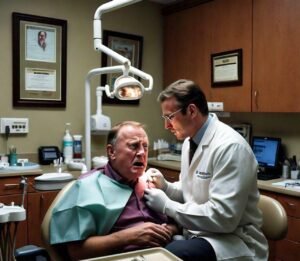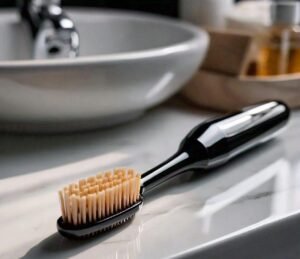The Importance of Brushing After Eating Meat: Maintaining Oral Health
Brushing your teeth after eating meat is important for several reasons related to oral hygiene and overall health. The detailed reasons are:
1. Prevent Plaque Formation:
Meat, especially red meat, can be fibrous and get stuck between the teeth. If not removed, these food particles can contribute to plaque formation.
Plaque is a sticky film of bacteria that forms on your teeth. When the bacteria in plaque come into contact with the flesh particles, they produce acids that can erode tooth enamel, leading to cavities.
2. Avoid Bad Breath:
Meat residue left in the mouth can break down and produce sulfur compounds, which are a major cause of bad breath.
Brushing your teeth helps remove these particles and odor.causing bacteria.
3. Maintaining Gum Health:
Food particles between the teeth and along the gums can cause irritation and inflammation of the gums.
If these particles are not removed, they can cause gingivitis (inflammation of the gums) and possibly progress to more serious periodontal diseases.
4. Prevent Tartar Buildup:
Plaque that is not removed by brushing can harden into tartar (calculus), which is more difficult to remove and requires a professional cleaning by a dentist.
Tartar buildup can lead to gum disease and tooth decay.
5. Preventing tooth discoloration:
Some types of meat, especially those that are heavily spiced or marinated, can leave stains on your teeth.
Regular brushing helps prevent these stains from becoming permanent.
6. Prevent Tooth Decay:
Meat, like other foods, can contain sugars and starches that bacteria use to produce acid. These acids attack enamel, causing tooth decay.
Brushing your teeth after eating helps to remove these sugars and acids, which prevents your teeth from decaying.
7. Overall Oral Hygiene:
Brushing after meals is a good practice for maintaining overall oral hygiene.
It ensures that your mouth stays clean and free of food particles and bacteria that can cause dental problems.
8. Prevention of Systemic Health Problems:
Poor oral hygiene can lead to systemic health problems. For example, gum disease has been linked to heart disease, diabetes, and other health conditions.
By maintaining good oral hygiene, you reduce your risk of these systemic health problems.
To get the maximum benefits of brushing after eating meat, it is recommended to wait at least 30 minutes after eating before brushing. This gives your saliva time to neutralize the acids in your mouth, reducing the risk of enamel erosion from brushing right after eating acidic foods.
Timing Matters: Should You Brush Immediately After Eating Meat?
Brushing immediately after eating meat is not strictly necessary, but maintaining good oral hygiene practices is important for overall dental health. Here are some detailed points to consider:
Why can brushing after eating meat be beneficial?
1. Removal of food particles: Meat can leave food particles between your teeth and along the gum line. Brushing helps remove these particles, which, if left behind, can lead to plaque buildup and potential dental problems.
2. Prevents bad breath: Meat, especially the fatty and protein.rich varieties, can cause bad breath. Brushing can help keep your breath fresh by removing food particles.
3. Acidity and enamel protection: Although meat itself is not very acidic, consuming it with other foods can create an acidic environment in your mouth. Brushing can help neutralize this acidity.
When to brush
1. WAITING TIME AFTER MEAL: It is generally advised to wait about 30 minutes after eating before brushing. This allows your saliva to naturally neutralize the acidity in your mouth, especially if your diet includes acidic foods or drinks. Brushing immediately afterwards can sometimes do more harm than good by spreading acid around your teeth, possibly wearing away the enamel.
2. Interim cleaning methods: If you are unable to brush right away, rinsing your mouth with water or using a mouthwash can help remove food particles and reduce acidity. Chewing sugar.free gum can also stimulate saliva production, which helps clean your mouth.
Comprehensive oral hygiene practices
1. BRUSHING REGULAR: Aim to brush at least twice a day, morning and night, using fluoride toothpaste.
2. Flossing: Floss daily to remove food particles and plaque between your teeth that can cause your toothbrush to miss.
3. Nutrition Considerations: Eating a balanced diet and reducing sugary snacks can help maintain good oral health.
4. Dental Checkup: Regular visits to the dentist for cleanings and checkups are very important to prevent and treat dental problems at the earliest.
Result
Although brushing immediately after eating meat is not an absolute necessity, it is beneficial to maintain a regular brushing habit and consider the timing and methods for optimal dental care. Waiting a little after eating before brushing, along with other good oral hygiene practices, will help keep your teeth and gums healthy.
The Risks of Skipping Brushing After Meat: Consequences for Oral Health

Not brushing your teeth after eating meat can lead to several oral health problems. Here are the key findings:
1. Plaque Formation: Meat particles can get stuck between your teeth and along the gum line. If not removed, these particles contribute to the formation of plaque, a sticky film of bacteria that coats the teeth.
2. Dental Decay: Bacteria in plaque eat food particles and produce acid. These acids can erode tooth enamel, leading to cavities and tooth decay.
3. Gum Disease: Plaque that is not removed can harden into tartar (calculus), which can only be removed by a dentist. Tartar buildup can irritate the gums, leading to gingivitis (gingivitis). If left untreated, it can progress to periodontitis, a more severe form of gum disease that can cause tooth loss.
4. Bad Breath: Meat particles left in the mouth can cause halitosis (bad breath). The breakdown of these particles by bacteria produces foul.smelling compounds.
5. Staining: While caries themselves may not cause significant staining, the buildup of plaque and tartar can discolor teeth over time.
6. Increased risk of infection: Meat particles can become a breeding ground for bacteria. If these bacteria overgrow, they can cause infections, such as dental abscesses, which are pockets of pus that form in the teeth or gums.
To maintain good oral hygiene, it is important to brush your teeth at least twice a day, including after meals when possible. Using dental floss or an interdental brush can help remove food particles from between the teeth, and mouthwash can further reduce bacteria and freshen breath. Regular dental checkups are also very important to catch and treat any developing problems early.
Meat Consumption and Oral Hygiene: Understanding the Impact on Dental Health
Eating meat can affect oral hygiene in both positive and negative ways:
Positive Effects:
1. Protein and Nutrients: Meat is a good source of protein, which is essential for maintaining healthy gums and tissues in the mouth. It also contains important nutrients like iron and zinc which are beneficial for oral health.
2. Chewing: Chewing meat can stimulate the production of saliva. Saliva helps wash away food particles and bacteria, neutralize acids in the mouth, and prevent tooth decay and gum disease.
Adverse Effects:
1. Food Particles and Plaque: Meat fibers can get stuck between the teeth, especially in tight spaces, which can lead to plaque buildup if not properly cleaned. This can increase the risk of tooth decay and gum disease.
2. Acid Production: Bacteria in the mouth can break down pulp particles, producing acids that can erode tooth enamel over time. It can contribute to cavities and tooth sensitivity.
3. Badness: Some meats, especially those high in fat, can cause bad breath (halitosis). Meat particles left in the mouth can be broken down by bacteria, producing sulfur compounds that cause bad breath.
Oral hygiene tips for meat eaters:
1. Regular Brushing and Flossing: Regular brushing and flossing is very important to remove plaque and prevent plaque build.up. Pay special attention to areas where meat fibers are likely to get caught.
2. Use mouthwash: Antibacterial mouthwash can help reduce bacteria in the mouth that break down food particles and produce acid and bad breath.
3. Stay Hydrated: Drinking water helps wash away food particles and bacteria. It also stimulates the production of saliva, which is essential for maintaining a healthy oral environment.
4. Regular Dental Checkups: Regular visits to the dentist can help catch any problems early and ensure that your oral hygiene routine is effective.
In summary, while meat provides essential nutrients that can benefit oral health, it requires diligent oral hygiene practices to minimize potential negative effects such as plaque build.up and bad breath.
The Link Between Skipping Brushing After Meat and Bad Breath: What You Need to Know

Yes, not brushing your teeth after eating meat can cause bad breath. Here are the details of how and why this happens:
Protein breakdown
1. Protein residue: Meat is high in protein, which when left in the mouth, can get stuck between the teeth and in the crevices of the gums. These protein residues provide a food source for bacteria in the mouth.
2. Bacterial activity: Oral bacteria, especially anaerobic bacteria, break down these protein residues, producing volatile sulfur compounds (VSCs) such as hydrogen sulfide and methyl mercaptan, which are responsible for bad breath. are responsible for
Plaque and food debris
1. Plaque Formation: Failure to brush your teeth allows plaque to build up. Plaque is a sticky film of bacteria and food particles. Over time, the bacteria in the plaque will continue to metabolize the food particles, creating the odor.
2. Food Particles: Meat particles stuck in the teeth and gums can decay over time, causing an unpleasant odor.
Dry mouth
1. Decreased production of saliva: Saliva helps wash away food particles and bacteria. Lack of brushing can lead to dry mouth, especially if combined with other factors such as dehydration or mouth breathing. A dry mouth allows bacteria to thrive and cause bad breath.
Gum disease
1. Gingivitis and Periodontitis: Poor oral hygiene can lead to gum diseases such as gingivitis and periodontitis. These conditions can cause bad breath due to inflammation and infection of the gums, which harbor odor.causing bacteria.
Other factors
1. Tarter Buildup: If plaque is not removed by regular brushing, it can harden and turn into tartar, which can only be removed by a dental professional. Tartar provides a surface where more bacteria can grow, causing bad breath.
2. Tongue coating: The tongue can also harbor bacteria and food particles. Brushing the tongue can help reduce bad breath, as it removes this buildup.
Recommendations for fresh breath
Regular brushing: Brush your teeth at least twice a day, especially after meals, to remove food particles and plaque.
Flossing: Floss daily to remove food particles and plaque from between the teeth.
Mouthwash: Use an antiseptic mouthwash to kill bacteria and freshen breath.
Hydration: Drink plenty of water to keep your mouth moist and help wash away food particles.
Dental Checkups: Visit your dentist regularly for cleanings and checkups to maintain oral health and address any issues that may be causing bad breath.
By maintaining good oral hygiene, including brushing after meals, you can significantly reduce the risk of bad breath from breaking down meat and other food particles in your mouth.
Meat and Dental Health: Debunking Myths and Examining Potential Risks Compared to Other Foods

Meat itself does not cause more dental problems than other foods, but certain aspects of meat consumption can contribute to dental problems. Here is an error:
1. Acidity: Some meats, especially processed meats like bacon or sausage, can be acidic. High acidity can erode tooth enamel over time, leading to dental problems such as tooth decay and sensitivity.
2. Sugar Content: Although meat does not contain sugar, some sauces or marinades used in meat dishes may be high in sugar. Consuming too much sugar can promote the growth of bacteria in the mouth, which can lead to plaque and tooth decay.
3. Texture: Hard or chewy meats can be abrasive on tooth enamel, especially if they contain bones or grease. Chewing hard meat can cause wear and tear on teeth over time, potentially leading to problems like cracked teeth or enamel erosion.
4. Diets: Grilling or barbecuing meat at high temperatures can produce compounds called heterocyclic amines (HCAs) and polycyclic aromatic hydrocarbons (PAHs), which have been linked to oral cancer. . However, this risk can be reduced by avoiding charred or heavily smoked meats and incorporating healthier cooking methods such as baking or stewing.
5. Bacterial growth: Raw or undercooked meat can contain harmful bacteria such as salmonella or E. coli, which can cause foodborne illnesses. Although these bacteria primarily affect the digestive system, they can also indirectly affect dental health if vomiting or diarrhea causes acid erosion of tooth enamel.
To reduce the risk of dental problems associated with meat consumption, it is important to maintain good oral hygiene practices such as regular brushing and flossing, limiting consumption of processed meats and sugary sauces, and eating Choosing healthy cooking methods. Additionally, eating a balanced diet rich in fruits, vegetables, and whole grains can promote overall dental health.
Teeth Troublemakers: Unveiling Which Meats Pose the Greatest Risks to Dental Health
No doubt! Certain types of meat may pose greater risks to dental health due to their specific characteristics. Here are a few:
1. Jarki:
Texture: The jerky is tough and fibrous, requiring prolonged chewing. This can increase the risk of damaging dental work such as fillings or crowns, and can also compress the jaw.
Sugar and salt content: Some commercial jerky may contain added sugars or salts, which can contribute to tooth decay and enamel erosion if teeth are not properly cleaned.
2. Bacon:
High Fat Content: Bacon is often high in fat. Although fat itself does not directly harm teeth, fatty foods can contribute to an overall less healthy diet, which can indirectly affect dental health.
Cooking Tips: Crispy bacon can be quite brittle, and can cut teeth if not chewed carefully.
3. Hot Dog:
Processing: Hot dogs are highly processed meat, often with additives and preservatives. Some additives may contain sugars or acidic compounds, which can contribute to tooth decay and enamel erosion.
Texture: The soft texture of hot dogs can cause them to stick to teeth, increasing the risk of bacterial growth and cavities if not cleaned properly.
4. Daily Meats:
Additives: Like hot dogs, deli meats may contain additives such as sugars, salts, and preservatives, which can be harmful to dental health.
Texture: Sliced deli meats can be sticky and collect between the teeth, providing a substrate for bacteria to thrive and potentially lead to cavities and gum disease.
5. Sausage:
Additives: Like hot dogs and deli meats, sausages often contain additives and preservatives, which can include sugars and salts.
Texture: Depending on the type of sausage and its casing, they can be chewy and require prolonged chewing, increasing the risk of tooth loss.
While this meat may pose some risks to dental health, it is important to remember that moderation and proper oral hygiene practices can help reduce these risks. Regular brushing and flossing, along with regular dental checkups, are key components of maintaining good dental health, regardless of dietary choices.
Savoring Every Bite: Expert Tips for Optimal Oral Care Post.Meat Consumption

It is very important to maintain good oral hygiene after eating meat to avoid dental problems such as plaque build.up, bad breath and possible gum disease. Here are some best practices:
1. Rinse with water: After eating meat, swish water in your mouth to flush out the remaining food particles. This helps prevent bacteria from feeding on food particles and forming plaque.
2. Brush your teeth: Ideally, wait about 30 minutes after eating before brushing your teeth. This allows saliva to neutralize the acid in your mouth, reducing the risk of enamel damage. Use fluoride toothpaste and a soft.bristled toothbrush to gently clean your teeth, gums, and tongue.
3. Floss regularly: Flossing is essential to remove food particles and plaque from between the teeth and along the gum line. Make it a habit to floss at least once a day, preferably before bed.
4. Use mouthwash: An antimicrobial mouthwash can help kill bacteria and freshen your breath after eating. Look for a mouthwash that contains fluoride and has the ADA (American Dental Association) seal of approval.
5. Chewing Sugar.Free Gum: Chewing sugar.free gum increases saliva production, which helps wash away food particles and neutralize acidity in the mouth. Look for gums that contain xylitol, a natural sweetener that can help prevent tooth decay.
6. Stay Hydrated: Drinking plenty of water throughout the day helps flush away food particles and keeps your mouth hydrated. Aim to drink water after meals and snacks, especially if you can’t brush your teeth right away.
7. Limit Sugary and Acidic Foods: Consuming sugary and acidic foods and drinks can increase the risk of tooth decay and erosion. Try to limit the amount of these foods, and if you do consume them, rinse your mouth with water afterward.
8. VISIT YOUR DENTIST REGULARLY: Regular dental checkups and cleanings are essential to maintaining good oral health. Your dentist can quickly identify any potential problems and provide personalized oral care recommendations.
By incorporating these practices into your daily routine, you can help keep your teeth and gums healthy after eating meat and prevent dental problems in the long run.
Brushing Away Decay: Exploring the Power of Post.Meal Oral Hygiene on Tooth Health
Brushing your teeth after eating meat can help prevent tooth decay, but it’s not just about timing. It’s also about your oral hygiene routine. Here are some details:
1. Plaque Removal: Meat can leave food particles and debris on and between your teeth. If not removed properly, these particles can feed on the bacteria in your mouth, leading to the formation of plaque, which can eventually lead to tooth decay. Brushing your teeth after eating meat helps remove these food particles and prevents plaque build.up.
2. Acidic Environment: Certain meats, especially processed ones, can contribute to the acidity of your mouth. An acidic environment can weaken tooth enamel, making them more susceptible to decay. Brushing your teeth after eating meat helps neutralize the acid and protect the enamel.
3. Fluoride Toothpaste: Using fluoride toothpaste while brushing helps strengthen tooth enamel and makes it more resistant to decay. Be sure to use fluoride toothpaste approved by dental associations.
4. Flossing: Flesh can often get stuck between your teeth where your toothbrush can’t reach. Flossing after eating meat helps remove these particles from between your teeth and along the gum line, reducing the risk of cavities and gum disease.
5. TIMING: It is best to wait at least 30 minutes after eating meat before brushing your teeth. This gives your saliva time to neutralize the acid and remineralize your enamel. Brushing right after eating acidic foods can actually damage your enamel because it is in a weakened state.
6. Hydration: Drinking water while eating meat can help wash away food particles and reduce the acidity in your mouth. It also promotes saliva production, which naturally cleans and demineralizes your teeth.
7. Regular Dental Checkups: Despite diligent oral hygiene practices, it is important to visit your dentist regularly for checkups and professional cleanings. Your dentist can detect early signs of decay or other dental problems and provide appropriate treatment.
Remember, brushing after eating meat can help prevent tooth decay, which is just one part of maintaining good oral hygiene. Daily brushing, flossing, a balanced diet, and regular dental checkups are all important components of keeping your teeth and gums healthy.
Timing Triumph: Perfecting Your Post.Meat Brushing Routine for Optimal Dental Health
After eating meat, it is generally recommended to wait about 30 minutes before brushing your teeth. This allows the pH level in your mouth to normalize after exposure to acidic foods, such as meat, which can temporarily weaken tooth enamel. Brushing immediately after eating acidic foods can potentially damage the enamel. Rinsing your mouth with water or chewing sugar.free gum can help neutralize the acid and promote saliva production until it’s safe to brush.
